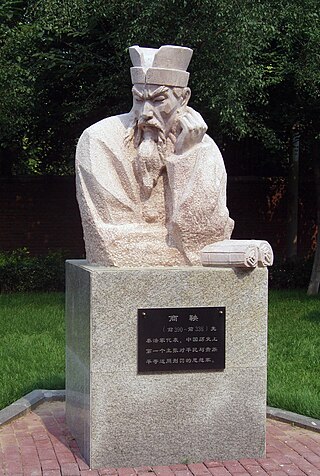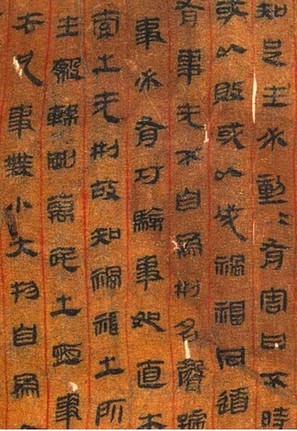Chinese classic texts or canonical texts or simply dianji (典籍) refers to the Chinese texts which originated before the imperial unification by the Qin dynasty in 221 BC, particularly the "Four Books and Five Classics" of the Neo-Confucian tradition, themselves a customary abridgment of the "Thirteen Classics". All of these pre-Qin texts were written in either Old or Classical Chinese. All three canons are collectively known as the Classics.

The Tao Te Ching is a Chinese classic text and foundational work of Taoism traditionally credited to the sage Laozi, though the text's authorship, date of composition and date of compilation are debated. The oldest excavated portion dates to the late 4th century BC, but modern scholarship dates other parts of the text as having been at least compiled later than the earliest portions of the Zhuangzi, the other foundational text of Taoism.

Fajia, often translated as Legalism, was a school of thought derived of classical Chinese philosophy. It represents several branches of thought of early thinkers mainly from the Warring States period, such as Guan Zhong, Li Kui, Shen Buhai, Shang Yang, and Han Fei, whose reform ideas contributed greatly to the establishment of the bureaucratic Chinese empire. With an influence in the Qin, it formed into a school of thought in the Han dynasty. The Qin to Tang were more characterized by the tradition.
Shen Dao was a Chinese philosopher and writer. He was a Chinese Legalist theoretician most remembered for his influence on Han Fei with regards to the concept of shi, but most of his book concerns the concept of fa more commonly by his school. Compared with western schools, Shen Dao considered laws that are not good "still preferable to having no laws at all."
Wu wei is an ancient Chinese concept literally meaning "inexertion", "inaction", or "effortless action". Wu wei emerged in the Spring and Autumn period. With early literary examples, as an idea, in the Classic of Poetry, it becomes an important concept in the Confucian Analects, Chinese statecraft, and Daoism. It was most commonly used to refer to an ideal form of government, including the behavior of the emperor, describing a state of personal harmony, free-flowing spontaneity and laissez-faire. It generally denotes a state of spirit or state of mind, and in Confucianism, accords with conventional morality.

Shek Wing-cheung, better known by his stage name Shih Kien, Sek Kin, Sek Gin or Shek Kin, was a Hong Kong–based Chinese actor and martial artist. Shih is best known for playing antagonists and villains in several early Hong Kong wuxia and martial arts films that dated back to the black-and-white period, and is most familiar to Western audiences for his portrayal of the primary villain, Han, in the 1973 martial arts film Enter the Dragon, which starred Bruce Lee.
The history ofTaoism stretches throughout Chinese history. Originating in prehistoric China, it has exerted a powerful influence over Chinese culture throughout the ages. Taoism evolved in response to changing times, with its doctrine and associated practices being revised and refined. The acceptance of Taoism by the ruling class has waxed and waned, alternately enjoying periods of favor and rejection. Most recently, Taoism has emerged from a period of suppression and is undergoing a revival in China.

The Huangdi Sijing are long-lost Chinese texts, manuscripts of which were discovered among the Mawangdui Silk Texts in 1973. Also known as the Huang-Lao boshu, they are thought by modern scholars to reflect a lost branch of early syncretist Daoism, referred to as the "Huang–Lao school of thought" named after the legendary Huangdi and Laozi. One finds in it "technical jargon" derived of Taoism, Legalism, Confucianism and Mohism.

Journey to the West is a Chinese television series adapted from the 16th-century novel of the same title. Production for the 66 episodes long series started on 12 September 2009, and it was first broadcast in mainland China on 28 July 2011 on TVS. The series was produced by Zhang Jizhong and was released a year later than another television series of the same title, but with a different cast and crew.
Huang–Lao was the most influential Chinese school of thought in the early Han dynasty, having its origins in a broader political-philosophical drive looking for solutions to strengthen the feudal order as depicted in Zhou politics. Not systematically explained by historiographer Sima Qian, it is generally interpreted as a school of Syncretism, developing into a major religion, the beginnings of religious Taoism.
Duke Dao of Qi was from 488 to 485 BC ruler of the State of Qi, a major power during the Spring and Autumn period of ancient China. His personal name was Lü Yangsheng (呂陽生), ancestral name Jiang, and Duke Dao was his posthumous title. Before ascending the throne he was known as Prince Yangsheng.
Yangzhou, Yangchow or Yang Province was one of the Nine Provinces of ancient China mentioned in historical texts such as the Tribute of Yu, Erya and Rites of Zhou.
Annotations to Records of the Three Kingdoms by Pei Songzhi (372–451) is an annotation completed in the 5th century of the 3rd century historical text Records of the Three Kingdoms, compiled by Chen Shou. After leaving his native land, Pei Songzhi became the Gentleman of Texts under the Liu Song Dynasty, and was given the assignment of editing the book, which was completed in 429. This became the official history of the Three Kingdoms period, under the title Sanguozhi zhu. He went about providing detailed explanations to some of the geography and other elements mentioned in the original. More importantly, he made corrections to the work, in consultation with records he collected of the period. In regard to historical events and figures, as well as Chen Shou's opinions, he added his own commentary. From his broad research, he was able to create a history which was relatively complete, without many of the loose ends of the original. Some of the added material was colourful and of questionable authenticity, possibly fictional. All the additional material made the book close to twice the length of the original. Pei Songzhi scrupulously cited his sources, and always introduced his opinion as such.

Li Ching, also spelled Lee Ching, was a Hong Kong actress.
Heshang Gong is the reputed author of one of the earliest commentaries on the Tao Te Ching of Laozi to survive to modern times, which is dated to the latter part of the Han dynasty. He was reputedly a reclusive Chinese hermit from the 1st century CE.
Taoist philosophy also known as Taology refers to the various philosophical currents of Taoism, a tradition of Chinese origin which emphasizes living in harmony with the Dào. The Dào is a mysterious and deep principle that is the source, pattern and substance of the entire universe.

Sun Yueh was a Taiwanese actor.
Fung Hak-on was a Hong Kong actor. He appears in Hong Kong films since the 1960s until mid 2010s.
Cheng Xuanying, courtesy name Zishi (子實), was a Taoist monk known to posterity as the "Master of Doctrines at Xihua Abbey“ (西華法師) and was one of the principal representatives of the "School of Double Mystery" (Chongxuan) during the reigns of the emperors Taizong and Gaozong of the Tang dynasty. He is mainly known for his commentaries to the Daodejing and the Zhuangzi.
Austin Wai Tin-chi was a Hong Kong actor and choreographer. He was the elder brother of actress Kara Wai. He had notable roles in the martial arts films like The 36th Chamber of Shaolin, 5 Superfighters, The Avenging Eagle and Flash Point.






